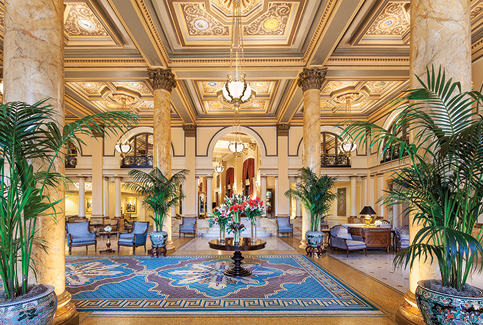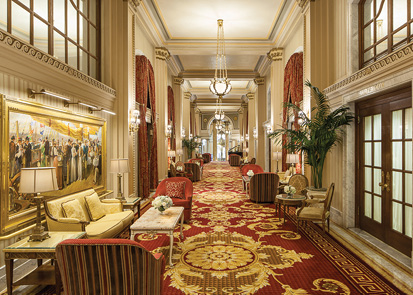- Home
- Media Kit
- Current Issue
- Past Issues
- Ad Specs-Submission
- Ad Print Settings
- Reprints (PDF)
- Photo Specifications (PDF)
- Contact Us


![]()
ONLINE

Experiencing History
Editors’ Note
Markus Platzer began his career as a night auditor at the Park Hilton in Munich, Germany, and eventually earned a role as Sales Manager at Hilton International’s hotel in Vienna, Austria. In 1992, he joined the IHG team at the InterContinental Hotel Abu Dhabi, and in a few short years became the Regional Manager, Travel Trade Development, for the United Arab Emirates, working from the company’s hotel in Dubai. He returned to Europe in 2001 as Director of Sales & Marketing for InterContinental Hotel Prague, the hotel where he first led operations as Resident Manager before beginning a seven-year stint in Bangkok, Thailand, overseeing four hotels in that country. More recently, he has served as Area General Manager for IHG in Japan, based at the ANA InterContinental Tokyo. Platzer earned bachelor’s degrees in international tourism and hotel management at the Tourism School Bad Gleichenberg and in business and commerce at Handelsakademie Feldbach, both in Austria.
Property Brief
A celebrated historic hotel, listed on the National Register of Historic Places, the Willard (washington.intercontinental.com) first opened its doors as a two-story rowhouse in 1818. Today, offering 335 guestrooms and suites, the Willard InterContinental remains an integral part of Washington, D.C., and is regarded as a world-class destination. Located in the heart of the nation’s capital, the property is within walking distance to many of the city’s most notable attractions including The White House and the National Mall. Nicknamed the “Residence of Presidents” for its long-standing reputation of hosting the world’s political and social elite, the Willard exudes contemporary luxury and historic charm.

The lobby of Willard InterContinental Washington D.C.
Will you discuss the history and heritage of the Willard, and what have been the keys to remaining relevant?
Here at the Willard, we take tremendous pride in the history and uniqueness of our property, recognizing the significant contributions that this legendary hotel has made, and continues to make, in this nation’s history. For 200 years, the Willard has welcomed U.S. presidents, foreign dignitaries and celebrities, and has been the site of many historic moments. The Willard is more than a hotel; it’s a living, breathing, piece of history and an iconic institution. Like Nathaniel Hawthorne said in 1862, “it’s the center of Washington.”
Yet, we can’t rest on our laurels. It’s important to utilize our heritage as the basis for serving the next generation of customers and guests to the property. Remaining relevant means keeping true to who you are, while being innovative. While our history will remain the centerpiece and the most important part of the hotel, we must evolve to remain competitive in the market and to attract the next generation of luxury travelers.
Are you happy with where the product is today or are their changes planned?
I am happy with the room product. This past spring, the hotel completed a multi-million-dollar refurbishment of all 335 guest rooms and suites, the historic Round Robin Bar, and our restaurant – Café du Parc, as a continuous investment to maintain and preserve this heritage property while also enhancing and elevating the guest experience. A celebratory year, the refurbishment came as an early birthday gift to the hotel as it celebrates its 200th Anniversary. I couldn’t be happier with the end result.

Peacock Alley
How important is a strong suite offering when it comes to the Willard’s clientele?
It’s very important. Here at The Willard we boast some of the largest hotel rooms in the city ranging in size from 375 square feet to 3,000 square feet. With 41 suites, all very residential in feel and each with their own identity and unique attributes, the Willard sets a distinct standard for the ultimate luxury experience for our clientele.
Washington has a strong culinary focus. Do you look at food and beverage as an amenity or is it an area where you can drive profit?
I look at our F&B program as a way to create exceptional experiences for our guests. While it is a necessary amenity, and driver of revenue, our culinary offerings –whether in our restaurant, bar, private dining or banquet spaces – are one facet of our business that allows our personality to shine through our rich diversity of cuisine.
How broad are the Willard’s meeting and banquet capabilities and will you discuss the strength of the property in this area?
With over 22,000 square feet of event space, the Willard offers 19 function rooms, including three ballrooms. We can accommodate groups as small as 5 all the way to 600 people. Like our suite product, our function spaces also have their own identity and unique attributes. Some even have quite a storied past – such as our Crystal Ballroom or Willard Room. Our hotel is known for the many historic moments that have taken place here over the past 200 years. You’re experiencing history in these rooms and the hotel. It’s a strength that definitely helps set our product apart.
Are there common characteristics that tie each of the InterContinental hotels together?
Brand standards are what tie InterContinental hotels together. They are the DNA of the brand and are critically important in communicating our brand promises to the consumer.
What is the state of the hotel business in Washington, D.C.?
Evolving and ever growing. Last year, Washington, D.C. welcomed a record-breaking number of visitors to the city – 22.8 million – which was a 3.6 percent increase from the previous year. At the moment, hotel room inventory continues to grow with 18 additional hotels to open in the coming years. The strengthening global economy is a huge driver of this growth and, as a result, we continue to find ways to be innovative and to remain competitive, as well as exploring new market segments including China, the Middle East and Europe.
Is there such a thing as forecasting today and how challenging is it to project a few years out?
It becomes very challenging. That is why revenue departments are growing and more people have been tasked with overseeing that function. Everything is last minute. We can forecast our base business because, as a large global company, we have a very strong booking engine and receive a certain percentage of our business from it. After that, it’s a balancing act. Accurate forecasting has been almost impossible.
Has the general manager role become more of a business position today and how do you make sure hospitality stays at the forefront?
Hospitality will always be at the forefront. That is the heart and soul of the business. The role of a GM is a delicate balance between maximizing profitability, managing employee expectations and delivering the most memorable experience for our guests.![]()